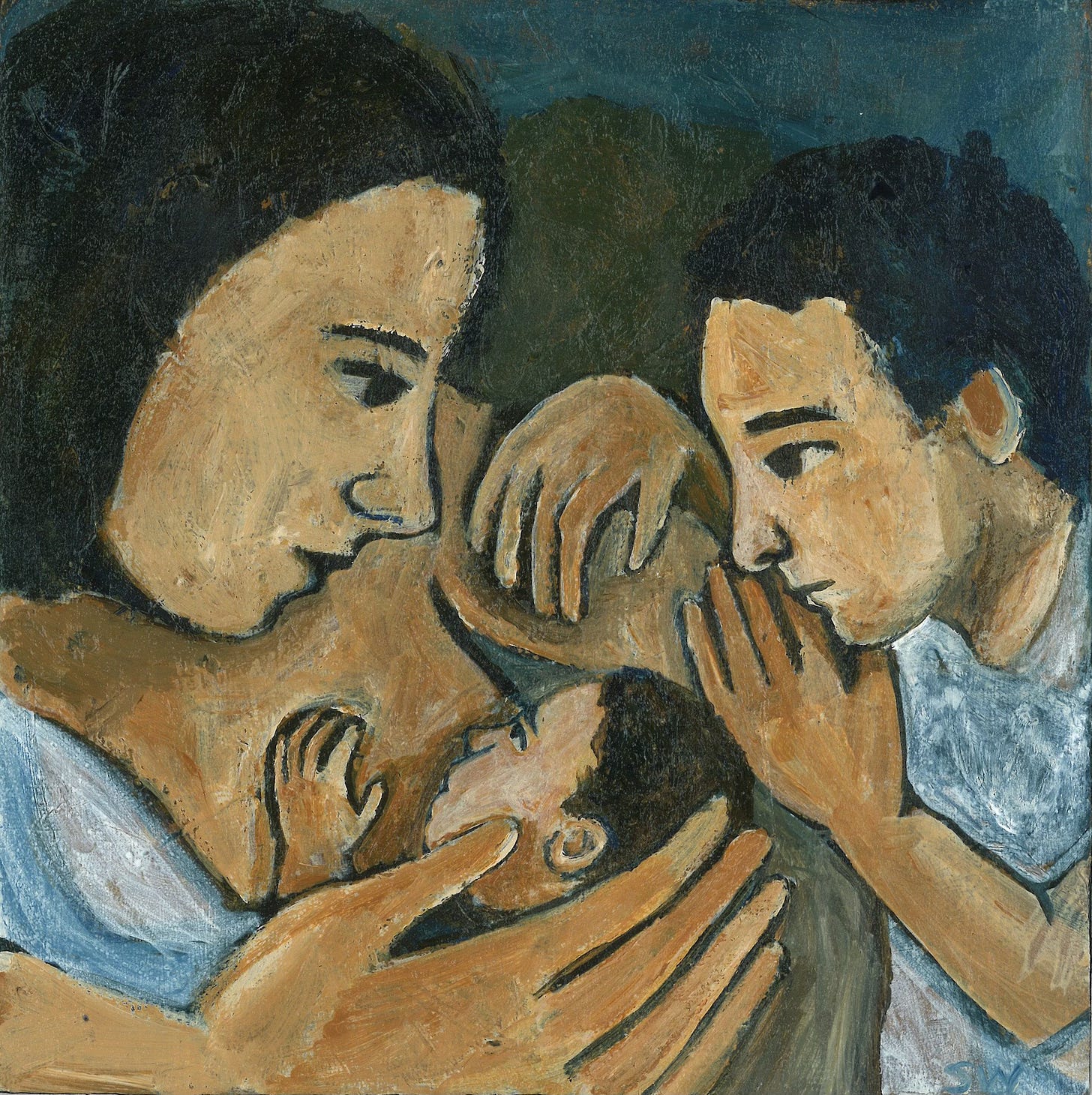Mother Tongues
Love, Language, and Communion
We kneel to pray, and as usual, I jostle with my younger brother for the right to rest my head and elbows on the couch. We keep the fighting quiet, or Dad will tell us to knock it off and turn around, and when it’s Mom’s turn to pray, we need the extra support because we know it will last forever. She prays for everything—for each member of our family by name, for the missionaries, for the prophet, for safety, for the Spirit to guide us to make good choices, and for a hundred other things that I don’t really understand, both because I am a child, and because Mom only prays in Spanish.
We live in Centerville, Utah in an unremarkable brick house. We look like most other families, but with darker skin, especially in the summer when my brothers and I turn brown brown brown. We have Mormonad and U2 posters on our walls, Transformers and Barbies in the toy bins, a basketball hoop in the backyard. But we eat beans and homemade flour tortillas, enchiladas and chile verde, and, on Christmas Eve, tamales at our güelitos’ house in Salt Lake City. We have wooden tops and hand-sewn dolls and a picture of Mom dancing folklórico on the wall. I’m the only kid at school, as far as I can tell, that has güelitos instead of grandparents, the only one that visits a blue house filled with color and warm smells and laughter of a different pitch and volume than I hear anywhere else. And Mom only prays in Spanish.
Her voice lowers almost to a whisper when she prays, and she always begins the same way. Not Our Dear Heavenly Father, we thank thee for this day but Nuestro Amado Padre Celestial, en este día estamos agradecidos.
I grow up in an enchanted world. God simply is. Everyone I know well belongs to the church. Everyone believes, or at least acts like they believe. Everyone prays. All the time. We pray over meals. We pray at the beginning of meetings. We pray morning and noon and night. But when my mom prays, it is different.
My broken Spanish keeps me from understanding large portions of her prayers, surely one reason they seem to last forever. My oldest sister still speaks and understands Spanish perfectly, but in descending birth order we are less and less fluent. I won’t speak Spanish well until I study and practice as a missionary in Pennsylvania; that’s still years away. But it’s not just the non-understanding that makes Mom’s prayers different. It’s the intimacy of her voice when she calls on God, the feeling of comfort and safety it generates.
I am pushing and squirming with my brother, sometimes giggling, and I hear Nuestro Amado Padre Celestial, and God feels beloved. Or not beloved, a word I wouldn’t recognize, but loved and loving. I am warmed by the intimacy of my mother’s prayer. Later, I will come to understand these family prayers as my first experiences with the Spirit, which is another way of naming a paradox: my Spanish is broken and halting, but Spanish is also my first language of the gospel, my mother’s tongue, and my spiritual mother tongue.
It's important for me to remember my mother’s prayers, because I have so often experienced and encountered language as alienation.
As a missionary twenty-five years ago, I served in a small, Spanish-speaking branch in Lancaster, Pennsylvania, the only non-English language unit in the mission at that time. We met in the basement of the chapel, usually no more than twenty people on any given Sunday. Most of the members were Puerto Rican, Cuban, and Dominican, though the first person we taught was a young man from Oaxaca, Mexico. They were line cooks, day laborers, construction workers, house cleaners, and nannies, whereas the adults I knew in the English-speaking ward were lawyers, businessmen, doctors, and stay-at-home mothers (which I recognized as a privilege for the first time in my life). The English-speaking ward provided the branch president and a high councilor, and I had the sense that we were somehow the shadow or younger sibling of the real ward.
Members of the English-speaking ward were always kind, and often invited us to dinner. But they said things that moved around in my mind like a pebble in a shoe. “It’s too bad that the branch can’t support itself,” they’d say. “How can we help them assimilate?”
“If they’d just learn English,” they’d say. This last point seemed somehow like the key to everything. “English is the language of the Restoration,” one brother told me. It was also the key to acculturation, so maybe learning English would unlock both spiritual and material doors.
The Lancaster branch was also my first experience working with youth who were, like me, no sabo kids, though this was long before “no sabo kid” was a thing. No sabo. I don’t know. Except in standard Spanish you say no sé. You’d only say no sabo if you didn’t understand how to conjugate the irregular verb saber, to know, so you did it like any other verb. If your language was broken. So you’re a no sabo kid. Your mom or your dad or your grandparents or all-of-the-above talk to you in Spanish, but you answer back in English. Or, in the case of the youth I worked with in Lancaster, then later when I lived in stakes in Los Angeles and Chicago, and now Oakland, you are surrounded not only by family members who speak to you in Spanish, but also youth leaders who view church as an opportunity for you to practice and perfect your language skills. Suddenly, your mother tongue becomes a chore and a site of judgment.
It’s alienation all the way down. Alienation, derived from the Latin word alienare, or “to estrange.” We encounter one another as strangers, or we are estranged from one another, even despite familial or community or ecclesiastical relationships meant to draw us together. There is no more estranging experience than not being able to communicate. You are trying to ask your güelita: “What was your dad like?” and all that comes out is, “y tu papá…” and then the long silence until your mom intervenes. And then she lights up and tells you all about his red beard, how he taught her the names of the constellations, how he died when she was only thirteen years old, but you get just scraps and fragments until she stops talking and your mom translates the whole thing, and then you wonder what the translation has missed.
Or you are a missionary trying to testify about the atonement, about how the word signifies being made one with God, except that in Spanish the word for atonement is expiación, which doesn’t signify reconciliation and wholeness, at least, not etymologically. So you talk around it, or try to explain how back in the day in England there was this guy named William Tyndale—should we call him Guillermo?—who made up a new word that changes the whole way we understand la expiación, that maybe it’s not about expiating (cleansing, purifying), but instead about something else. But no circumlocution will do. And then one day you begin to wonder if atonement really is better than expiación, or if your spiritual life is richer for having them both, and if it would be richer still if you understood how Japanese and Quechua and Shona speakers talk about what Christ did for us.
When I asked my mother why she always prays in Spanish, she responded that it feels more intimate to her. It’s her true mother tongue and the language she associates with first learning the gospel. There’s another reason for that sense of intimacy. In English, we’re taught to address God using the archaic pronouns thee and thou as a sign of respect. In Spanish, we address God using the informal tú, rather than the more formal usted. We address God the way we would a family member or a friend, rather than a stranger. This is actually equivalent to the English thee and thou, which formerly indicated familiarity and intimacy, as in the King James Version of the Bible. Here again our spiritual lives become richer in the passage between languages. For a long time I’ve prayed thinking of the Spanish tú and allowing it to charge my thee and thou pronouns with the static electricity of communion.
Linguistic alienation is frustrating because we tend to think of language as both referential and expressive. It is referential in the sense that we use language to refer to a reality that exists independent of how we communicate, and it is expressive in the sense that we use language to articulate our distinct thoughts and emotions. The breakdown of either of these functions is painful. Growing up, I had a hard time expressing myself to my güelitos in language they could understand, and vice versa. As a missionary, I sometimes felt a gap between the language I possessed and the spiritual reality I wanted to communicate to others.
But here’s something a no sabo kid knows from an early age: linguistic alienation does not only describe a problem that exists across languages. Linguistic alienation is simply a fact of human experience. It’s true that expressing myself to my güelitos was frustrating before I learned to speak Spanish more fluently. It’s also true that expressing myself to my wife in our shared first language of English can sometimes be just as difficult. It’s not that I lack words. There are always words. This is one reason we will never exhaust the possibilities of love poems and songs. We are always searching for a new language to express how we feel. And what’s more, how we feel is always changing, so we need to find new language to match our evolution as we move through different experiences and stages of life. There are always words, but they never seem to be enough.
Similarly, there will always be a gap between human language and spiritual experience. I feel this most often in prayer, and I rely on Paul’s encouraging words in his letter to the Romans: “Likewise the Spirit also helpeth our infirmities: for we know not what we should pray for as we ought: but the Spirit itself maketh intercession for us with groanings which cannot be uttered” (Rom. 8:26). Spanish, my mother’s tongue, was an imperfect vessel, but so is English, and so is every other language we speak. I’m realizing now as a father that what I heard during those family prayers when I was young was not language, but a yearning that exists beyond language. I hope my children hear it now.
As a former no sabo kid I have learned that language is not merely referential and expressive—it is also, and perhaps most importantly, creative. I grew up with tíos and tías and cousins who understood this instinctively, who liked to eat a good lonche and when you asked where Güelito was, said he was in the bedroom watcheando his novelas. If I needed my mom to translate for my güelita when I asked her about her father, why was that a loss? Now the stories had to be told twice, shaped and passed through two minds and mouths before arriving in my ears. Now the stories were a room that held four people together—my great-grandfather Refugio, whom I never knew; my güelita Mila, whose eyes shined with her father’s memory; my mother, also Mila, who loved to sit close with a hand on Güelita’s arm or shoulder; and me, always learning what could and couldn’t be said in English, Spanish, or any other language.
Nephi says that after we receive the Holy Ghost we can “speak with the tongue of angels” (2 Ne. 32:2), and that he delights in the scriptures so much that his heart “pondereth them, and writeth them for the learning and profit of [his] children” (2 Ne. 4:15). Language here isn’t only about referring to some preexisting reality, even a reality as urgent as God or the gospel. And if it is about expression, that expression demands new forms. We speak with the tongue of angels, and we ponder what has been written, and we write new truths ourselves. Just as we will never exhaust the possible love songs and poems in our mother tongues, we will never exhaust the potential psalms and praise poems.
Even if we only say the same things over and over again, our language is creative. If we tell our children every day how bad they are at school, if we tell them how lazy they are, we might discover to our chagrin that we have summoned those qualities in them. If we repeat the sentence, “English is the language of the Restoration,” to ourselves and others, we contribute to a church in which that ends up being the case. We put the Spanish branch in the basement.
Or, if we say, as I learned to do as a child, “Te quiero,” to our grandmother every time we say goodbye, even if we can hardly say anything else in her language, then we create a bond that bridges the divide of linguistic alienation, a relationship that outlasts even her death. If we say, as my mother did ten thousand times when we were growing up, “Padre Celestial, te pedimos que proteges y cuides a nuestros hijos,” then even if those hijos don’t understand the words for protect and care, even if they don’t understand why they need protection or care, we might find we have created through our language a place for them to dwell. And if we can build that small space, surely something bigger is possible—a church with no basement, a cathedral, a city of God where we are no longer strangers.
Lent is a season of preparation. We prepare to rise from the death of the old self to new life, and new relationships, in Christ. This essay beautifully considers the formation of relationships through the veils of language and difference through which we connect. To receive more essays like this during the Easter season, please manage your subscription under your account and turn on notifications for Holy Days.
John Alba Cutler is an associate professor of English at the University of California, Berkeley. He is a member of the Moraga Ward in the Oakland Stake.
Art by Sarah Winegar.
SYMPOSIUM ON WEALTH AND MERIT
SAVE THE DATE
WAYFARE FESTIVAL 2025
Join us in Park City on July 12, 2025 for a day of invigorating ideas and fresh friendships in a gorgeous setting. Gather with friends, artists, writers, and fellow wayfarers. It will be a feast for the soul. RSVP to come soon.
CHECK OUT OUR NEW PODCAST
KEEP READING
Trunk
If we focus on the tree in our mind’s eye, the upright and striking form of its physical presence comes forth. Its vertical line moves our eyes upward to the fruit and leaves of its branches, to the skies above. The trunk is the main organ of the tree. Its rigid woody structure provides the central support for all that happens to the tree. It supports t…
Why Church?
In fairness, probably a lot of people could have had on their 2025 bingo card something like “Ross Douthat writes a book defending faith as a rational decision.” Mr. Douthat is open about his religiosity and has done a great deal (along with Tish Harrison Warren and now David French) to make belief palatable—or at least less weird—to the
Burdens and Yokes
We use the term “burden” to describe things that are heavy to hold and carry. This may be toilsome work, sin, or oppressive circumstances. These are the parts of life that make us feel the most limited, lonely, defeated, and mortal.
The Heart's Surrender
I felt arms wrapped around me, and as hands gently began to pry my tense fingers open, I heard a whisper, “Let go.”














This is fantastic.